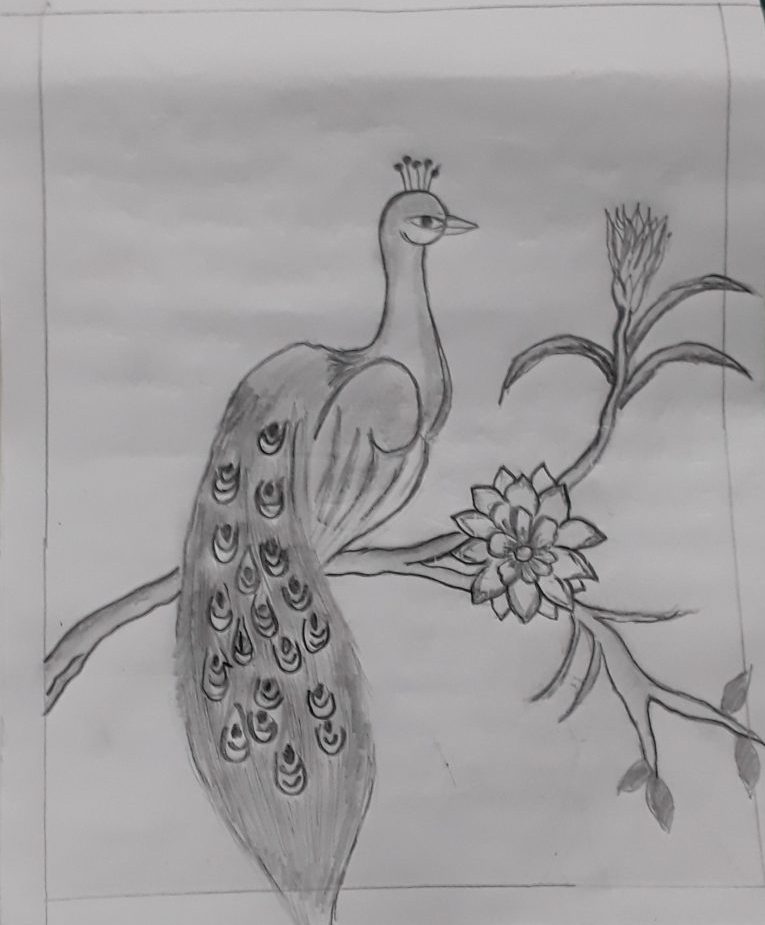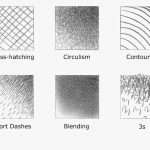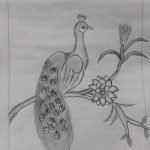
India’s National Bird: A Child’s Peacock Drawing In Pencil
The peacock, with its resplendent plumage and majestic demeanor, has long captivated the hearts of young and old alike. This magnificent bird, aptly chosen as India’s national bird, embodies the country’s vibrant spirit and rich cultural heritage.
Today, we celebrate the peacock’s beauty through the eyes of a budding artist, Aniruddha Dutta from Techno India Group Public School, who has captured its essence in a remarkable pencil sketch.
Pencil grades range from H (hard) to B (black/soft), with HB in the middle. What are the different types of pencil grades, and how are they used?

Here’s a quick breakdown:
H pencils: These are harder, create lighter lines, and are great for sketching, fine details, and technical drawings.
HB pencils: The middle ground, good for general drawing and sketching.
B pencils: Softer, create darker lines, and are ideal for shading, creating depth, and expressive drawings.
Experiment with different grades to find what works best for your style and subject matter.
Hatching: Creating parallel lines for shading.Pencil Hatching Technique Cross-hatching: Adding another layer of hatching at a different angle for darker tones. Blending: Using a blending tool (like a tortillon or tissue) to smooth out pencil strokes. Pencil Blending Technique Stippling: Creating a shaded area with dots. What are some basic shading techniques for pencil drawing?

How do I improve my pencil drawing skills?
Aniruddha’s Masterpiece: A Peacock’s Portrait in Pencil
Aniruddha’s pencil sketch is a testament to the power of children’s art to express the wonders of nature. His bird drawing showcases the peacock perched on a branch, its graceful neck curved and a single flower nestled beside it. The intricate details of the feathers, rendered in delicate pencil strokes, are a marvel of observation and skill.
Nature Art through a Child’s Eyes
Aniruddha’s work is not just a peacock drawing; it is a window into the world of nature art, an ode to India’s rich biodiversity. It reminds us of the importance of observing and appreciating the beauty around us, fostering a sense of wonder and connection to the natural world.
Crafting Your Own Peacock: Pencil Sketch Tutorial
Creating your own peacock drawing in pencil is a fun and rewarding activity. Let’s delve into a simple, step-by-step tutorial to guide you through the process.
Materials Needed:
- Pencil (HB or 2B)
- Eraser
- Paper
Step-by-Step Instructions:
- Basic Shapes: Start by sketching a large oval for the body and a smaller circle for the head.
- Neck and Beak: Connect the head and body with a curved line for the neck. Add a small triangle for the beak.
- Feathers: Sketch the outline of the tail feathers, starting with a large fan shape and adding smaller feathers within.
- Details: Draw the eye, crest, and legs. Add details to the feathers, such as “eyes” and patterns.
- Shading: Use your pencil to add depth and texture to your drawing. Shade the feathers, body, and head, creating a sense of light and shadow.
Tips and Tricks:
- Use light strokes initially, so you can easily erase and adjust your lines.
- Experiment with different shading techniques to create texture and depth.
- Don’t be afraid to make mistakes! Art is about experimenting and exploring.
Encourage Creativity and Exploration
Remember, there’s no right or wrong way to create art. The most important thing is to have fun and let your creativity flow! Experiment with different styles and approaches to discover your own unique artistic voice.
Engaging in art activities like drawing offers numerous benefits for children. It promotes fine motor skills, hand-eye coordination, and cognitive development. Art also encourages creativity, imagination, and self-expression, helping children to develop a positive sense of self and a love for learning.
Conclusion: Let Your Creativity Soar!
Drawing a peacock is a wonderful way to celebrate India’s national bird and explore your artistic talents. Whether you follow our tutorial or create your own unique interpretation, remember that art is a journey of self-discovery and joy. So grab your pencil, let your imagination soar, and create your own masterpiece!
Share Your Creations: We invite you to share your beautiful peacock drawings with us at Curious Times. Your artwork could inspire others and showcase the incredible talent of young artists like yourself! Visit our website at https://curioustimes.in/subscriber-posts/ to submit your creations.
Watch a video
“दो से मोर बनाना? इतना आसान!” (Draw a Peacock from the Number 2? It’s That Easy!)!
Curious Times is a leading newspaper and website for kids. We publish daily global news aligned to your learning levels (also as per NEP 2020): Foundational, Preparatory (Primary), Middle and Senior. So, check out the News tab for this. We bring kids’ favourite Curious Times Weekly newspaper every weekend with top news, feature stories and kids’ contributions. Check out daily JokesPoke, Tongue Twisters, Word of the Day and Quote of the Day, kids need it all the time.
ME – My Expressions at Curious Times is your place to get your work published, building your quality digital footprint. And it is a good way to share your talent and skills with your friends, family, school, teachers and the world. Thus, as you will step into higher educational institutes your published content will showcase your strength.
Events, Quizzes and Competitions bring students from over 5,000 schools globally to participate in the 21st-Century themes. Here schools and students win certificates, prizes and recognition through these global events.
Sign-up for your school for FREE!
Communicate with us: WhatsApp, Instagram, Facebook, Youtube, Twitter, and LinkedI
0 (Please login to give a Curious Clap to your friend.)
SignUp to Participate Now! Win Certifiates and Prizes.


Login/Signup